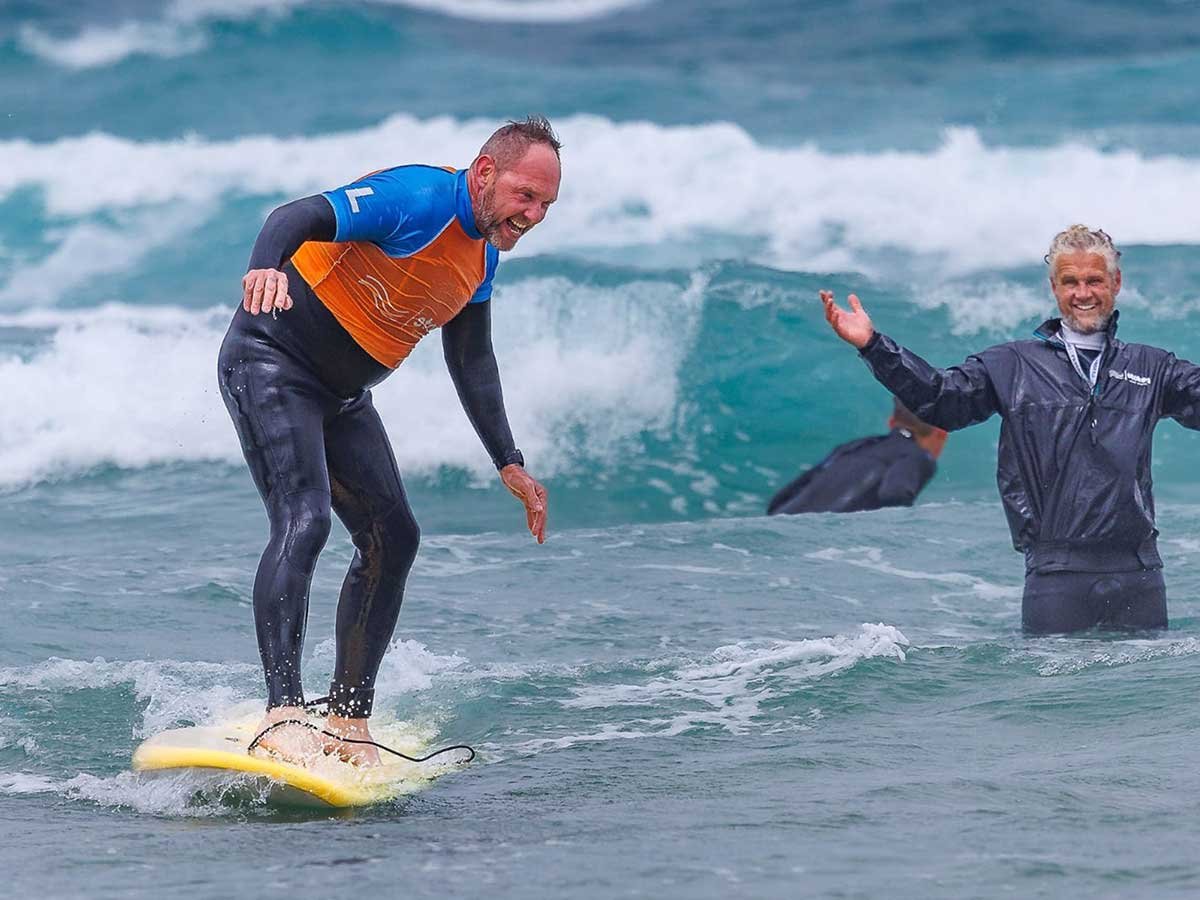
Father’s Day 2024 Offer
09/06/2024
Surfing Etiquette
19/06/2024Surfing And Mental Health
How Surfing Can Improve Wellbeing
In today's fast-paced world, mental health has become a significant concern for many. According to leading mental health charity Mind, 1 in 6 people report experiencing a common mental health problem, such as depression or anxiety.
While physical exercise is widely known to benefit mental wellbeing, the unique sport of surfing offers even more profound mental health advantages. Combining the physical workout with the therapeutic elements of nature, surfing has a special way of enhancing mental health and overall wellbeing.
In this post, we will explore the relationship between surfing and mental health, and how this incredible sport can improve your mental and emotional state.
The Physical Benefits of Surfing
Whilst this post will focus mainly on the positive mental effects surfing has on the body, it's important to acknowledge the physical benefits as they also have a knock-on effect on good mental health.
Surfing is a full-body workout that engages various muscle groups and promotes cardiovascular health. Paddling out to catch waves strengthens the upper body, while standing up and riding the waves engages the core and lower body muscles. This physical exertion leads to the release of endorphins, the body's natural feel-good hormones, which help reduce stress and anxiety. In fact, leading medical website WebMD conducted research which concluded that exercise was often an underused, but effective way to treat mild to moderate depression.
Additionally, regular physical activity, such as surfing, has been shown to improve sleep patterns, boost energy levels, and enhance overall physical health. The connection between physical health and mental wellbeing is well-documented, as a healthy body often leads to a healthy mind. By incorporating surfing into your routine, you can experience these physical benefits while also boosting your mental health.


The Impact of Nature and the Ocean
One of the most compelling aspects of surfing is its intimate connection with nature, particularly the ocean. Being in and around water has a calming effect on the mind, often referred to as the "blue mind" state - a theory popularised by marine biologist Wallace Nichols. This concept describes the meditative and peaceful feeling that water bodies induce, which can significantly reduce stress and anxiety.
The rhythmic sound of waves, the sight of the vast ocean, and the feel of water against the skin all contribute to this soothing effect. Engaging with the natural environment while surfing allows individuals to disconnect from daily stresses and immerse themselves in the present moment. This connection with nature not only enhances mental clarity but also promotes a sense of peace and relaxation.
Another way connecting with nature helps with mental health is that by being outside in the sun (a rarity sometimes here in Cornwall!), provides you with vitamin D. Studies have shown that low levels of vitamin D can lead to, or exacerbate depression, so getting out on that surfboard on a sunny day will top you up. Just don't forget an appropriate, waterproof suntan lotion!
Surfing and Mindfulness
Surfing requires a high level of focus and concentration, making it an excellent practice for mindfulness. When you're out in the water, your attention is naturally drawn to the waves, your movements, and your surroundings. This intense focus on the present moment helps to quiet the mind and reduce the constant chatter of daily worries.
Much like traditional mindfulness practices, surfing encourages you to stay present and fully engage with the experience at hand. The act of riding a wave demands full attention, leaving little room for intrusive thoughts. This meditative state achieved through surfing can help alleviate symptoms of anxiety and depression, promoting a sense of calm and wellbeing.


Building Confidence and Overcoming Fears
Learning to surf is a journey that involves overcoming various challenges, which can significantly boost self-confidence. The process of mastering the skills required to ride waves, from paddling to standing up, instills a sense of achievement and resilience. Each successful ride reinforces the belief in one's abilities, which translates to increased confidence both in and out of the water.
For many, the ocean can be a source of fear due to its vastness and unpredictability. Confronting and overcoming this fear by learning to surf can be empowering. This newfound confidence often spills over into other areas of life, helping individuals face challenges with greater assurance and determination. At Stoked Surf School, our experienced instructors provide guidance and support, ensuring that learners feel safe and encouraged throughout their surfing journey.
Social Connections and Community
Surfing is not just an individual sport; it fosters a strong sense of community and social connection. Being part of a surfing group or community offers numerous mental health benefits. The camaraderie and shared experiences create a support network where individuals can form lasting friendships and find encouragement.
Engaging with others who share a common passion for surfing provides a sense of belonging and reduces feelings of isolation. Social interactions and supportive relationships are crucial for mental health, and surfing communities often provide this essential support.
Here at Stoked Surf School, we run a couple of initiatives aimed at building these social connections through learning to surf - Grom Squad, aimed at younger people and the Stokals, which is a programme for any local person to come along and try their hand at learning to surf. Through these surfing programmes friendships are made and the mental health benefits can be seen first-hand.


Case Studies and Personal Stories
Many individuals have experienced significant improvements in their mental health through surfing. For instance, professional surfer Bethany Hamilton's story of resilience after a shark attack has inspired countless people. Despite losing her arm, she returned to surfing and continues to be a symbol of strength and positivity, inspiring people from all walks of life.
Local surfers also share similar stories of how surfing has transformed their lives. Joe, the content & website manager here at Stoked Surf School, initially struggled with anxiety but he found that regular surfing sessions helped him to manage it much better than he had before and even increased his confidence after a few sessions with the Stokals. His personal story highlights the powerful impact of surfing on mental health and wellbeing.
Tips for Beginners
If you're new to surfing and eager to experience its mental health benefits, here are some tips to get started:
- Take Lessons: Enrol in a beginner's surf lesson at Stoked Surf School to learn the basics from experienced instructors.
- Start Slow: Begin with small, manageable waves to build your confidence and skills gradually.
- Stay Consistent: Regular practice is key to improving both your surfing abilities and mental wellbeing.
- Join a Community: Communities, such as the Stokals here in Perranporth, help you to connect with other surfers to share experiences and support each other.
- Enjoy the Process: Focus on the joy of being in the water and the progress you're making, rather than comparing yourself to others.
Our head coach Julian has also provided some of his own "do's and don'ts" for beginners to check out.

Surfing and Mental Health - Conclusion
Surfing offers a unique blend of physical, mental, and social benefits that can significantly enhance your overall wellbeing. By immersing yourself in the ocean, practicing mindfulness, and building confidence through surfing, you can experience profound improvements in your mental health. Whether you're a beginner or an experienced surfer, the positive effects of surfing are undeniable. At Stoked Surf School, we're dedicated to helping you unlock these benefits and achieve your full potential in the surf. Dive in and discover the transformative power of surfing on your mental health.








